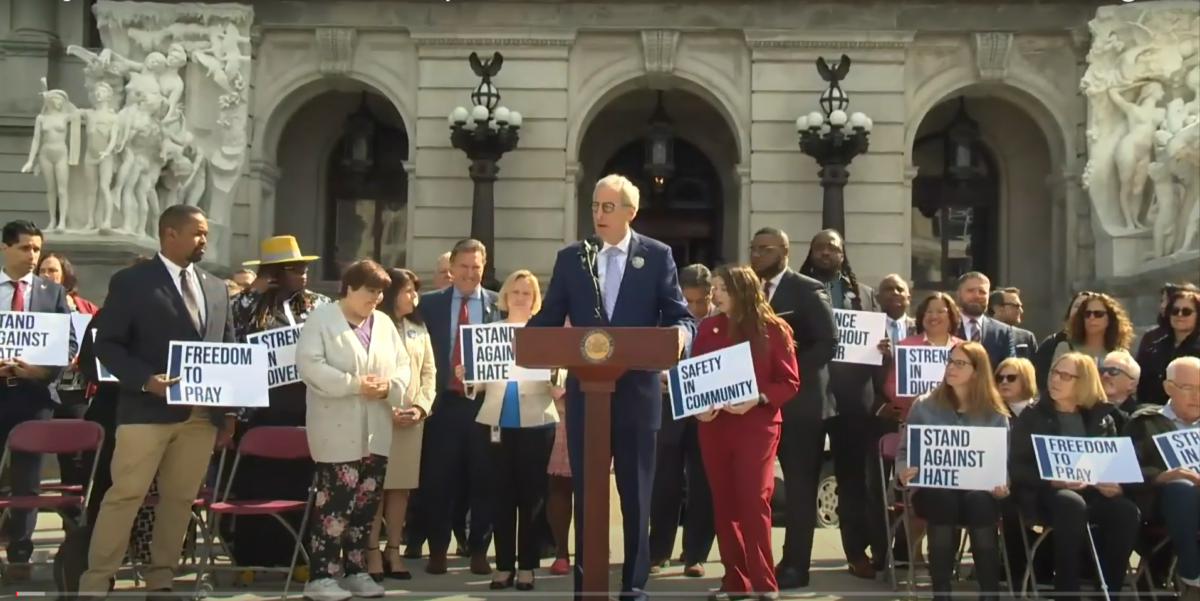On the same day that jury selection began in the Pittsburgh synagogue shooting trial, state Rep. Dan Frankel, state Sen. Jay Costa (both D-Allegheny) and state Rep. Napoleon Nelson (D-Montgomery) unveiled new anti-hate crime legislation at the Pennsylvania State Capitol Complex.
The four bills unveiled at the Stronger Than Hate news conference and rally on the Capitol steps in Harrisburg, and sponsored by Frankel, Costa and Nelson, are meant to modernize laws in the commonwealth to address hate crimes and ethnic intimidation, provide state-supported training for police to identify and react to hate crimes, punish hate crime perpetrators by requiring them to learn about the groups they targeted, and require schools and post-secondary institutions to offer online and anonymous hate crime reporting options for students and employees.
The bills are HB 1027: “Stand Together Against Ethnic Intimidation”; HB 1024: “Give Police the Tools They Need”; HB 1025: “Educate to Rehabilitate”; and HB 1026: “Give Colleges and Schools the Tools They Need.”
Frankel opened the news conference by referencing the Oct. 27, 2018, synagogue shooting, noting that loved ones of those killed in the attack were in attendance. The affected families, the congregations and Squirrel Hill would never be the same, he said.
“When Jews are attacked in Pittsburgh for their faith, a Chinese American shop owner in Allentown gets scared and closes up shop, a transgender teenager in Philadelphia decides not to attend an LGBTQ+ prom, an Islamic teacher in Erie chooses not to share with students why he fasts on Ramadan, an administrator at a school for the visually impaired considers fewer trips out of the city — when people are attacked or threatened or harassed for who they are, how they look or who they love, individuals in every community start to wonder, ‘Is someone going to hurt me?’” he said.
“Pennsylvania,” Frankel continued, “cannot address the growing danger of hate crimes with 40-year-old laws.”
Costa said the bills were about defending everyone’s rights to gather in prayer wherever they want, love whoever they want, look how they choose and live life the way they decide.
The senator added that the commonwealth has helped to provide enhanced security since Oct. 27, 2018, but that it isn’t enough to address the needs.
“We have to provide the tools to our lawmakers and have laws on the books that allow us the opportunity to be able to enforce those freedoms,” Costa said. “That’s what these measures are talking about.”
Nelson began his address to the crowd by recalling the oft-quoted words of Benjamin Franklin: “Those who give up essential liberty to purchase a little temporary safety deserve neither liberty nor safety.”
“I very much respect and revere Ben Franklin, but, as we say in our community, his privilege is showing just a bit,” Nelson said.
There is no such thing as temporary safety when hate crimes go unreported and unchecked, he added.
McKeesport native Lt. Gov. Austin Davis invoked many of the same sentiments, saying that everyone in the commonwealth deserves to feel safe in their community, no matter how they look or worship.
“That feeling of safety has been shattered for so many Pennsylvanians, for our Jewish and Muslim and Sikh brothers and sisters, for our LGBTQ folks, for Black and brown Pennsylvanians across the commonwealth,” he said.
The Shapiro/Davis administration, he said, is committed to keeping the Pennsylvania community safe.
“It’s time to get to work, pass this hate crimes legislation and get it to the governor’s desk,” he concluded.
Rep. Joanna McClinton (D-Delaware and Philadelphia counties), the speaker of the state House of Representatives, said that while there is a long way to go, she is encouraged to know that the four bills introduced were beginning to move through the House.
Of particular note was Rep. Jessica Benham’s (D-South Side) remarks. Co-chair of the House LGBTQ+ Equality Caucus, Benham represents District 36, which includes many of Pittsburgh’s southern communities that abut the South Hills suburbs.
Benham noted that she is both a queer woman and an openly autistic person.
“The expansion of protections to include LGBTQ+ and disabled people is critically important now,” she said.
Frankel told the Chronicle that the legislation, for the first time, protects the LGBTQ+ community. Andrew Goretsky from the Philadelphia office of the Anti-Defamation League, Arc of Pennsylania’s Elise Westcott, Majid Alsayegh and Thomas Tropp from the Philadelphia Muslim-Jewish Advisory Council, and Navtej Grewal from the Sikh Coalition also addressed those in attendance.
Each of the three congregations attacked on Oct. 27 — Dor Hadash, New Light and Tree of Life — sent representatives to the news conference, including Debi and Don Salvin, Peg Durachko, Sharyn and Leigh Stein, Dana Kellerman, Stephen Weiss and Suzanne Schreiber. Jewish Federation of Greater Pittsburgh Security Director Shawn Brokos also attended.
Cindy Goodman-Leib of Pittsburgh attended the conference. She said that legislation is key to ensuring a safer future, and HB 1027 and the hate crimes package offer much-needed tools.
“While there is so much we can’t change,” she said, “through our words, presence, relationships, collaboration and our actions, we defy hate and antisemitism and show how we are ‘stronger than hate.’”
The fact that “Stand Together Against Ethnic Intimidation” is numbered HB 1027 was intentional. Frankel said it’s one way to memorialize what happened on Oct. 27, 2018, while paying respect to the families of the victims and the survivors.
He said he’s confident that if the bill can get to the Senate floor it will pass with bipartisan votes.
“We just need some Republican leaders, who control the agenda, to agree to run these bills,” he said. “I think I’m guardedly optimistic about that.”
Frankel told the Chronicle that having the families at the news conference was moving. “The families have a range of emotions and a range of ways they are trying to cope with the trial that in many ways retraumatizes them and our entire community,” he said. “For some, I think it’s helpful to say, ‘Here’s something that we can do and something that addresses what caused that vicious, antisemitic attack.’”
David Rullo writes for the Pittsburgh Jewish Chronicle, where this first appeared. This story is part of ongoing coverage of the Pittsburgh synagogue shooting trial by the Pittsburgh Jewish Chronicle and the Pittsburgh Union Progress in a collaboration supported by funding from the Pittsburgh Media Partnership.



